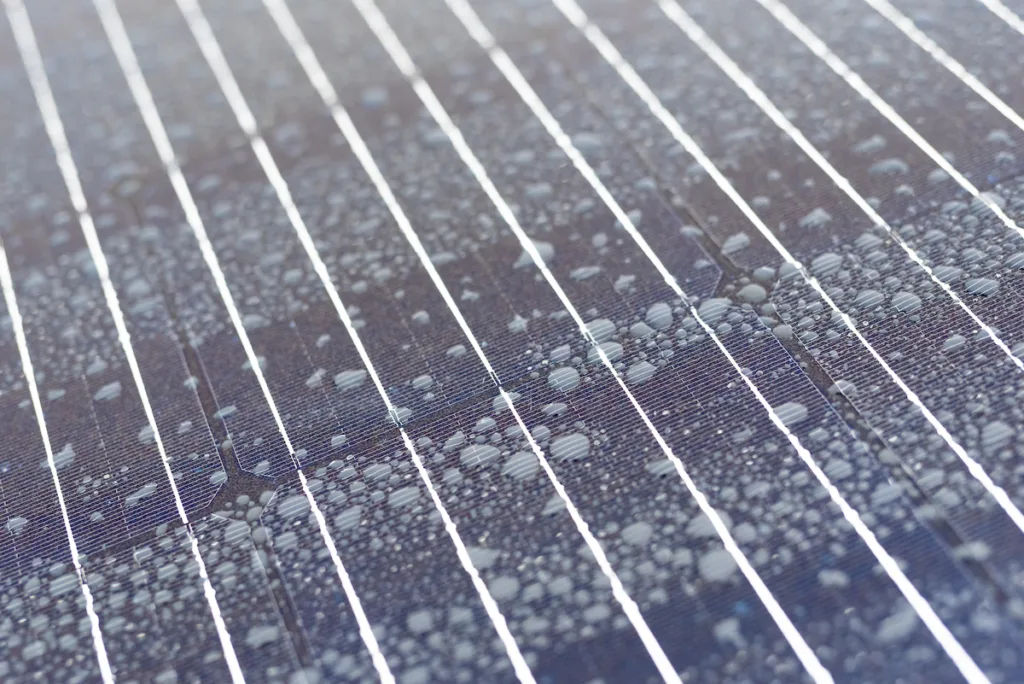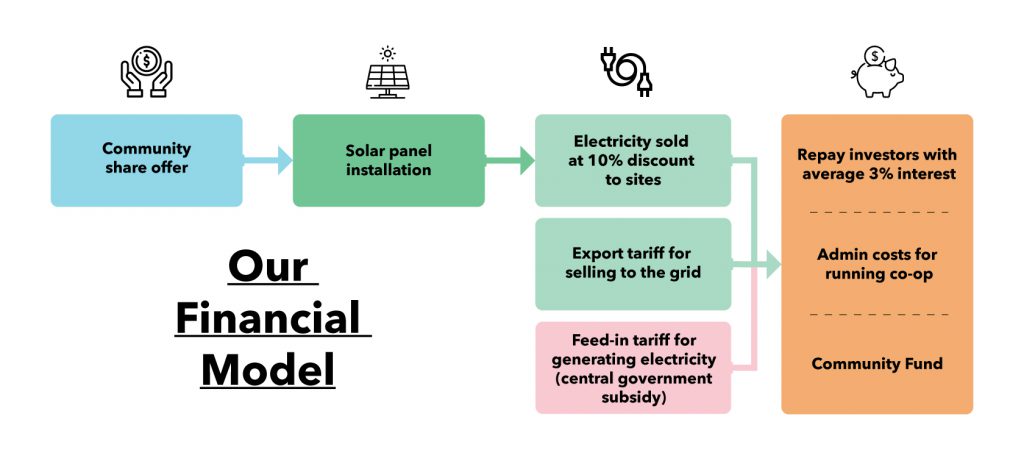A starter guide to installing solar photovoltaic panels on your home from the team at Repowering London
Here at Repowering London we want to see London lead the world in urban renewable energy and are working towards that by helping create solar co-operatives that are run by and serve its local communities.
But while we specialise in solar installations that are jointly owned by (and for) the community, we also get a lot of questions about private installs. We aren’t able (yet) to help with solar home installation directly, but we know they are a really important part of the transition to renewable energy. That’s why we have put together some FAQs to help you on your journey to clean, green electricity!
Q1: Do I need permission to install panels?
It sounds a little crazy, but you can own your home and not your roof, so whether you can install solar panels may not just be your own decision. For example, if you are a leaseholder in a block of flats, you may not be an owner of the roof. You can usually find out about roof ownership in your deed or lease agreement. If you are the freeholder of a house then you will (most likely) be the owner of the roof. If you live on the top floor of a block of flats, or in some blocks if you live on any floor, you might have access to the roof but require a license for alteration to install any solar panels. This can be a simple process, and free from your freeholder, but it can also have a fee associated with it. In any case, you should double-check your deed or lease agreement and ask your freeholder and/or building manager where relevant, so that you fully understand what permissions and agreements you may need to install solar panels. You should also ask your installer company for advice and guidance on this.
Q2: What if I live in a conservation area?
If you live in a conservation area you should check with your council to see if you need planning permission to install solar panels on your home. Most solar panels come under what’s called “permitted development” but this isn’t always the case in conservation areas.
Q3: Where can I find a solar installer?
As with any major works you have done on your house, when it comes to installing solar panels on your home get recommendations, check reviews from trusted sources (see Question 5 for a few ideas), do your homework, and get three quotes so that you have a range of options to choose from.
Ask around among your neighbours and locals who have had panels installed, also. What was their experience? Did the company they used do a good job?
When you do meet an installer to discuss your solar panel installation they should be happy to answer any questions you have. If you feel under pressure to purchase, beware. If an installer is pressuring you to make a decision quickly, before you feel you have had your questions answered, or makes you feel uncomfortable in any way then think carefully about using them. There is a lot of work to go around at the moment so decent installers shouldn’t be in a hurry and you may even face a long wait time to get your work completed.
Q4: Where can I check whether a solar installer is worth employing?
Along with its informative guides like this one, the Which? website is a good place to start for recommendations of solar installers in your area. You can plug your postcode in and find a Which? Trusted Trader installer near you. You can also take a look on Checkatrade and Yell.com. If you are a member of a Repowering London-backed solar co-operative – or even if you aren’t – you may find people willing to share their experiences of installing solar panels on their homes at our volunteer meetings and community events. Look at our website to see if there is a co-op near you and follow our social channels for news of meetings and events that you can come along to.
Q5. What is the Microgeneration Certification Scheme (MCS)?
MCS is the consumer protection scheme for solar installations in the UK. You should use an MCS-qualified installer to ensure your installer is up to date with the latest regulations, technologies and safety standards. The MCS website also has a searchable database of installers. Using this alongside the Which? website can be useful. However, some installers on the Which? website don’t list their MCS certification so you need to use the MCS website to double check.
Top tip: Make sure you search by name or increase the number of installers listed (using a drop down tab on the right-hand side) to get a full list on the MCS site. It is not a legal requirement to be MCS certified to install solar panels, but it is a requirement that your installer is MCS certified and provides you with an MCS commissioning certificate for your array if you want to be eligible for the Smart Export Guarantee (see the next question). Even if you aren’t claiming the guarantee consider using a MCS-certified installer.
Q6: What is the SEG?
The Smart Export Guarantee (SEG) is a scheme initiated but not paid for by the Government, that means you can get paid for any surplus electricity you make. Electricity suppliers have to offer a rate to buy surplus electricity from households. You don’t have to buy and sell your electricity from the same supplier but some offers are only available if you do.
You are not eligible for the Smart Export Guarantee if you don’t get your installation MCS certified. Along with the assurances of quality that come with your installer and products being MCS certified, the installation must be signed off as such and proof provided for you to be eligible for these payments. The same goes for lots of government schemes and subsidies.
Q7: What about second-hand panels?
Lots of us who are worried about where our electricity comes from are also worried about where our other stuff comes from. Choosing pre-loved, refurbished and repaired is a great option to keep your carbon emissions and materials footprint down. There isn’t a well-established second-hand market in the UK for solar photovoltaics (solar panels) but you may find some online.
Beware, though, that even if second-hand panels are in working order your installation cannot get MCS sign off (even if it is installed by a MCS-qualified installer) if the panels installed are not new. So, think about your export tariff carefully. Unless you are very confident, buying second-hand is tricky in the UK at the moment.
There is some great work going on in eco-labelling, so you can see the impact the production of solar panels is having and can consider this when you are buying. Ethical Consumer has recently started scoring solar panel producers. You can check out the guide here. The Electronic Product Environment Assessment (EPEAT) has recently included embodied carbon in its labelling criteria, an industry first. As with any product we buy, it’s important that we, as consumers, keep these topics on the agenda.
Q8: How long will the solar panels on my home work?
Solar panels are designed to last a long time. At Repowering London, we usually plan for the solar panels we install with our community energy co-ops to last for 20 years. Having a good installer and a good operations and maintenance plan will extend the life of your installation. When it comes to the end of your panels’ life, think about the embodied carbon and always make sure you dispose of your solar panels correctly for recycling (with an organisation like PV Cycle). Recycling technology for solar panels is not perfect – it is expensive, energy- and resource-hungry and sometimes involves nasty chemicals – but it is constantly improving.
Q9: What about warranties and guarantees?
Solar panel manufacturers and installers offer warranties and guarantees of varying lengths and on different elements of the installation. Generally, these will consist of:
- 10-year limited product warranty (materials and labour)
- 25-year limited power/performance warranty (typically 10 years at 90% power output and 25 years at 80% power output)
- Workmanship and materials warranty of one or two years
- Batteries (non-grid systems/hybrids) roughly 5-15 years
- Inverter(s) warranty of between 5-10 years.
When you are comparing quotes for solar panel home installation ensure that you also compare the guarantees that come with the installation. Make sure your installer makes it clear how they will deal with any problems that arise.
Q10: How can I make sure my solar panels are looked after?
Details on operations and maintenance (O&M) should form part of the contract with and/or handover from your installer. Make sure you check what is included, how long it lasts, and who is financially responsible (and when) if there is a problem. On a pitched roof cleaning is usually not required very often because the angle of the panels and the UK weather do the job for you. If your installation is at a shallow angle, under trees that will drop a lot of leaves, or where bird poo might gather, you may need more frequent cleaning. Solar Energy UK has put together a guide on O&M here and there is more information on maintenance here.
So, are you ready to go for home solar?
As you can see, there are quite a few things to consider when thinking about installing solar panels on your home, but don’t be put off! There are plenty of excellent installers out there who have now been operating for a long time. Again, just make sure you get a recommendation or look at reviews from a trusted source.
Here are some links to other handy guides to start you on your journey. Good luck!
- Installing renewables at home – Energy Saving Trust
- Solar PV checklist – Questions to ask installers – Centre for Sustainable Energy
Please note: This guide is about installation of solar photovoltaic (PV) systems. In these systems, photons from the sun are absorbed by the panels and in turn release electrons, which results in a flow of direct current. This is then converted into alternating current by an inverter for safe use as an electricity source in the home. These should not be confused with solar thermal panels, which use collectors to absorb heat from the sun into a fluid, which is then transferred to a specialist hot water cylinder that can provide water heating for the home. You can learn more about solar thermal systems here


